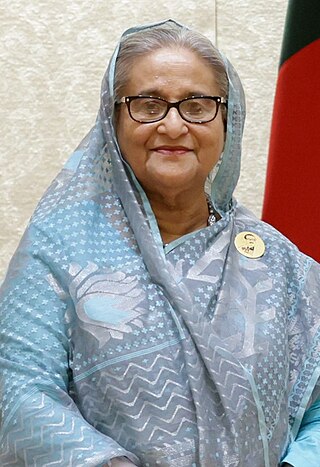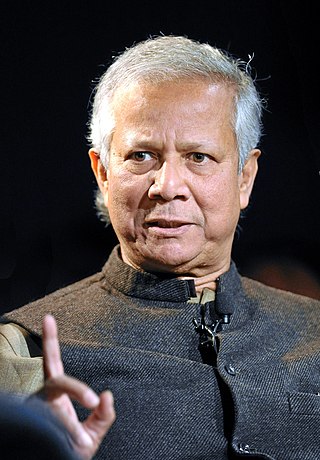
Sheikh Hasina is a Bangladeshi politician who served as the tenth prime minister of Bangladesh from June 1996 to July 2001 and again from January 2009 to August 2024. She is the daughter of Sheikh Mujibur Rahman, the first president of Bangladesh. She served in the position of prime minister for over 20 years, making her the longest-serving prime minister in history of Bangladesh. Thus, she has become the world's longest-serving female head of government. Her authoritarian regime ended in self-imposed exile following a series of violent protests by the students in 2024.

The history of Bangladesh (1971–present) refers to the period after the independence of Bangladesh from Pakistan.

The Government of the People's Republic of Bangladesh is the central executive government of Bangladesh. The government was constituted by the Constitution of Bangladesh comprising the executive, the legislature, and the judiciary. Bangladesh is a unitary state and the central government has the authority to govern over the entirety of the nation. The seat of the government is located in Dhaka, the capital of Bangladesh.

General Waker-Uz-Zaman OSP SGP psc is a four star general of the Bangladesh Army who is the current Chief of Army Staff (CAS) of the Bangladesh Army since 23 June 2024. Prior to his appointment as CAS, he served as the Chief of General Staff (CGS) of the Bangladesh Army. He is also the Colonel Commandant of Army Service Corps. Previously, he served as the 15th Principal Staff Officer of Armed Forces Division.
Obaidul Hassan is a jurist who briefly served as the chief justice of the Supreme Court of Bangladesh. He was appointed as the chief justice on 12 September 2023 and served as 24th Chief justice of Bangladesh. He also served as the president of the Inquiry Committee, 2022 for the formation of Bangladesh Election Commission. He was forced to resign as Chief Justice in the aftermath of the Student–People's uprising.

The Bangladesh protests of 2022–24 were a series of anti-government demonstrations against the administration of Prime Minister Sheikh Hasina. Initiated by the Bangladeshi opposition parties on 10 December 2022, the protests continued spite of the government crackdowns. Though initially low-level, with instances of vandalism in late 2023, the movement gained momentum in 2024. The protests became linked to the Student–People's uprising, as both shared similar objectives related to government accountability and systemic change. In July 2024, the unrest intensified and turned into a civil disinvestment movement, ultimately leading to Hasina's resignation and eventual exile from the country.

Mohammed Shahabuddin natively known as Chuppu, is the 16th and incumbent President of Bangladesh. A jurist, civil servant and politician, he was elected unopposed in the 2023 presidential election in the nomination of the ruling Awami League. Prior to his presidency, Shahabuddin served as a district and sessions judge and a commissioner of the Anti-Corruption Commission from 2011 to 2016.
The following is a list of scheduled and expected events for the year 2024 in Bangladesh. 2024 (MMXXIV) is the current year, and is a leap year starting on Monday of the Gregorian calendar, the 2024th year of the Common Era (CE) and Anno Domini (AD) designations, the 24th year of the 3rd millennium and the 21st century, and the 5th year of the 2020s decade.

The July massacre was the violent suppression and mass killings in Bangladesh during the July Revolution from July 16 to August 5, 2024. Triggered by the reinstatement of a controversial quota system and widespread public dissatisfaction, the crackdown was carried out by the government led by the Awami League party, its affiliated groups such as the Chhatra League, and various law enforcement agencies.

The non-cooperation movement, also known as the one-point movement, was a pro-democratic disinvestment movement and a mass uprising against the Awami League-led government of Bangladesh, initiated within the framework of 2024 Bangladesh quota reform movement. The sole demand of this movement was the resignation of Prime Minister Sheikh Hasina and her cabinet. It was the final stage of the wider movement known as the Student–People's uprising.

An interim government led by Muhammad Yunus was formed on 8 August 2024 in Bangladesh, following the resignation of Prime Minister Sheikh Hasina on 5 August 2024 amid nationwide student and public protests against the government. Following the dissolution of the 12th Jatiya Sangsad on 6 August 2024, the interim cabinet will remain in office until a new Prime Minister is appointed after a snap general election. The government, like the previous non-caretaker government interim administrations, is extra-constitutional. However, the Appellate Division of the Supreme Court of Bangladesh affirmed the legality of the stopgap government on 9 August 2024, citing the urgent need to manage state affairs and address the constitutional vacuum, similar to previous cases. The main pledge of his ministry is organize a constituent assembly to draft and adopt a new, democratic and inclusive constitution, ensuring the inviolability of human dignity.

Nahid Islam is a Bangladeshi student activist who serves as an advisor to the 2024 Bangladesh interim government. He is a key coordinator of the Anti-discrimination Students Movement, which led the Student–People's uprising, ultimately resulting in Prime Minister Sheikh Hasina's resignation. He was named on the Time 100 Next list in 2024.

Asif Mahmud Shojib Bhuiyan is a Bangladeshi student activist, who is currently serving as an advisor to the Bangladesh interim government. He is a key coordinator of the Anti-discrimination Students Movement, which led the Student–People's uprising. He is also the former president of Bangladesh Students Right Council at Dhaka University unit.

Md Sarjis Alam is a Bangladeshi activist. He is one of the leading coordinators of the Anti-discrimination Students Movement, which led the Student–People's uprising leading to the overthrow of Prime Minister Sheikh Hasina’s government.

Hasnat Abdullah is a Bangladeshi student activist and Convener of the Anti-discrimination Students Movement, which led the Student–People's uprising. He is currently a student in the English Department at University of Dhaka.

The leadership of Muhammad Yunus began on 8 August 2024 when he was sworn in as the Chief Adviser of Bangladesh by President Mohammed Shahabuddin. In August 2024, after the resignation of Sheikh Hasina as Prime Minister and her departure to India, the key coordinators of the protest announced that Yunus would be Chief Adviser of the Interim Government. The main pledge of the interim government is organize a constituent assembly to draft and adopt a new, inclusive, democratic constitution, ensuring the inviolability of human dignity.
Mahfuz Alam also known as Mahfuz Abdullah, is a Bangladeshi student activist and a coordinator of the liaison committee of Anti-discrimination Students Movement which led the Student–People's uprising. He currently holds the position of Special Assistant to the Chief Adviser of the Interim Government of Bangladesh.

The Student–People's uprising, also known as the July Revolution, was a pro-democratic mass uprising in Bangladesh. It began as a quota reform movement in early June 2024, led by university students, after the Bangladesh Supreme Court invalidated the government's 2018 circular regarding job quotas in the public sector. The movement escalated into a full-fledged mass uprising after the government carried out mass killings of protesters, known as July massacre, by the late of July. By early August, the movement evolved into a non-cooperation movement, ultimately leading to the ouster of the then-Prime Minister, Sheikh Hasina, who fled Bangladesh to India. Hasina's ouster triggered a constitutional crisis, leading to the formation of a semi-revolutionary government led by the country's only Nobel laureate, Muhammad Yunus, as the chief adviser.

A constitutional crisis emerged in Bangladesh on August 5, 2024, after the Prime Minister, Sheikh Hasina, resigned and fled the country to India as protesters stormed her residence and office in Dhaka during a massive mass uprising. Hasina's flight to India triggered the constitutional crisis because the existing constitution has no provisions for an interim government or any other form of government in the event that the prime minister resigns and the parliament is dissolved. Although Article 123 of the constitution mandates general elections within 90 days following the dissolution of parliament, no clear guidelines exist for the powers and structure of an interim government.
The 2024 Bangladesh Presidential resignation protests are an ongoing protest demanding President Mohammed Shahabuddin's resignation stem from his controversial remarks following the resignation of former Prime Minister Sheikh Hasina. Protesters accuse Shahabuddin of siding with authoritarian forces, fueling dissatisfaction among students and civil society groups.














